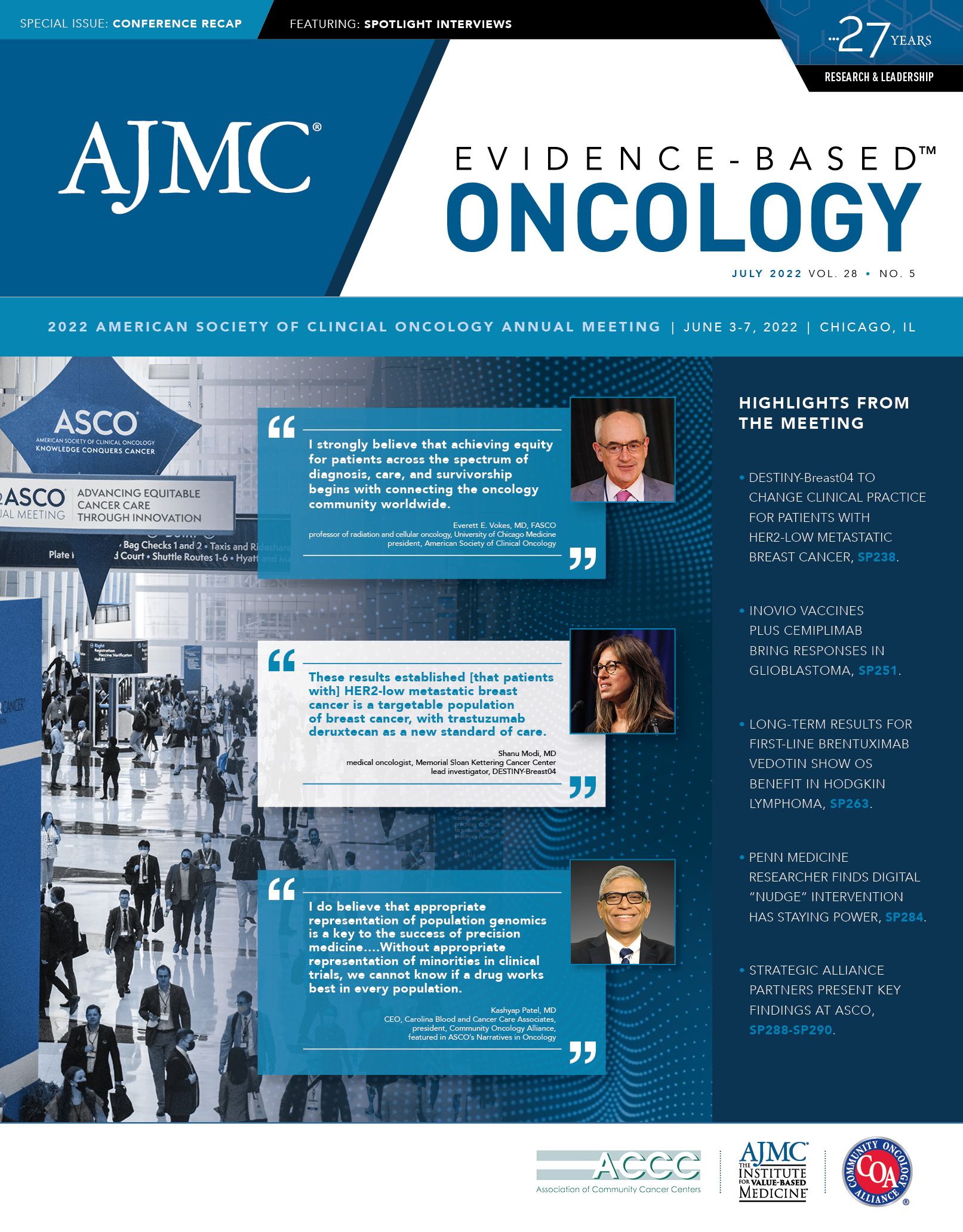- Center on Health Equity & Access
- Clinical
- Health Care Cost
- Health Care Delivery
- Insurance
- Policy
- Technology
- Value-Based Care
From Research to Health Care Delivery, Patt’s Versatility Is Cited by ASCO
Keeping up with Debra Patt, MD, PhD, MBA, at the 2022 Annual Meeting of the American Society of Clinical Oncology (ASCO) was no small feat.
On the day of the ASCO plenary, the longtime breast cancer specialist and executive vice president, health care policy and strategic initiatives at Texas Oncology, bounced from interview to interview to explain the importance of the biggest trial of the meeting, DESTINY-Breast04, which will be a game changer for patients with advanced HER2-low breast cancer.1
This came after wall-to-wall meetings in Patt’s capacity as secretary of the Community Oncology Alliance and her participation in a panel discussion, “Stronger Together: Women Supporting Women.”
The next day, a paper that Patt co-authored, “Evaluating mass implementation of digital health solutions to improve quality and reduce disparities in a large multisite community oncology practice,” was presented as part of ASCO’s Care Delivery and Regulatory Policy track. The data showed that White, non-Hispanic female patients were more likely to be engaged in a care management platform than other demographic groups, but that men did use a patient portal more often than women.2
But Patt left it to others to share the news of a major honor from ASCO: her inclusion in the 2022 Narratives in Oncology, which highlights 10 physicians selected by their peers for profiles in The ASCO Post.3
Patt wears other hats in cancer care leadership: she is president of the Texas Society of Clinical Oncology and editor of JCO Clinical Cancer Informatics. And her calendar stayed full after ASCO: on June 23, Patt hosted a session of the Institute for Value-Based Medicine®, an initiative of The American Journal of Managed Care® (AJMC®). Patt is also a member of the board for Evidence-Based Oncology™ and a member of the steering committee for Patient-Centered Oncology Care®, the annual meeting hosted by AJMC®.
In her Narratives interview, Patt credits her father, an engineer, with inspiring her love of science, and her mother’s “exuberant energy” with fueling her passion for patient care. Patt explains that she initially planned for a career as a bench scientist and loved being in the laboratory. Then, an encounter with a patient whose care delays led to a terminal diagnosis of cervical cancer took her career in new direction. She also combined her medical studies with a focus on public health when few were doing so.
Patt’s love of data—and her use of it to drive policy change—drew her to Texas Oncology, where she would have The US Oncology Network database available for health services research. Patt has been an important voice during the COVID-19 pandemic, collaborating with other community oncologists to track the drop-off in cancer screening and showing, through data, how some minority populations have still not returned to prepandemic breast cancer screening rates.4
The Narratives citation noted Patt’s advocacy for broader access to care. Based in Austin, where she is also a clinical professor at Dell Medical School at The University of Texas, Patt sees patients from a variety of ethnic and socioeconomic backgrounds, many of whom lack health coverage. She discussed the disparities in outcomes among these patients in an interview last year:
“Between the ages 19 to 65, [there’s] about 25% of adults in Texas who don’t have access to insurance. We know in that patient population, that they’re 6 times more likely to present with advanced cancer, and they die more rapidly of their disease because they present with advanced cancer,” Patt said. “I think the access issue is a real hurdle that has to be overcome.”5
References
1. Modi S, Jacot W, Yamashita J, et al. Trastuzumab deruxtecan in previously treated HER2-low advanced breast cancer. N Engl J Med. Published online June 5, 2022. doi:10.1056/NEJMoa2203690
2. Patel AM, Bhardwaj A, Basch E, et al. Evaluating mass implementation of digital health solutions to improve quality and reduce disparities in a large multisite community oncology practice. J Clin Oncol. 2022;14(16_suppl):Abstr 1507. doi: 10.1200/JCO.2022.40.16_suppl.1507
3. Piana R. Growing up in a house filled with science leads to a career in breast cancer and health outcomes research: Debra Patt, MD, PhD, MBA. The ASCO Post Narratives Special Issue. June 3, 2022. Accessed June 26, 2022. https://bit.ly/3QUY0rI
4. Patt D Gordan L, Patel K, et al. Considerations to increase rates of breast cancer screening across populations. Am J Manag Care. 2022;28(SP3):SP136-SP138. doi: 10.37765/ajmc.2022.88855.
5. Caffrey M. Disparities in cancer care: Has precision medicine widened the gap? Am J Manag Care. 2021;27(SP3):SP89-SP90.

Empowering Children and Parents Through Technology: Opportunities, Challenges, and Future Directions
January 15th 2026Digital health platforms improve pediatric care by offering customized, interactive tools for children and parents. They enhance education, support, and engagement while tackling challenges related to access, usability, and privacy.
Read More
Telehealth Intervention by Pharmacists Collaboratively Enhances Hypertension Management and Outcomes
January 7th 2026Patient interaction and enhanced support with clinical pharmacists significantly improved pass rates for a measure of controlling blood pressure compared with usual care.
Read More
